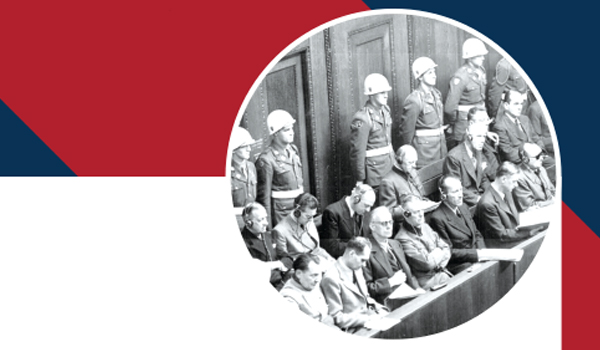 Professor Marshall Breger addressed a conference on the Nuremberg Principles: Contemporary Challenges held at The Catholic University of America on Monday, March 27. The conference considered the Nuremberg Trials of Nazi War Criminals from 1946-1949, the resultant Nuremberg Principles and their application to present day issues including the Ukraine conflict. It brought together international criminal law, political science, theological and ethical perspectives on the subject.
Professor Marshall Breger addressed a conference on the Nuremberg Principles: Contemporary Challenges held at The Catholic University of America on Monday, March 27. The conference considered the Nuremberg Trials of Nazi War Criminals from 1946-1949, the resultant Nuremberg Principles and their application to present day issues including the Ukraine conflict. It brought together international criminal law, political science, theological and ethical perspectives on the subject.
Breger spoke on issues of Memory and Forgetting and the value of a Truth and Reconciliation commission such as the one used in South Africa after the fall of apartheid.
Breger was a co-organizer of the conference, which was hosted by the Institute of Policy Research at Catholic. Other partners included the International Research and Documentation Center for War Crime Trials at the Phillips-University Marburg; Federal Ministry of Justice of the Federal Republic of Germany; Embassy of the Federal Republic of Germany, Washington, DC; The International Nuremberg Principles Academy, Nuremberg, Germany; and the Case Western Reserve University School of Law.
The conference speakers included an array of international criminal law experts as well as the “go-to” people on war crimes in the American government.
Among the other speakers were: Christoph Safferling, Professor of International Criminal Law, Friedrich-Alexander-University School of Law Erlangen-Nuremberg, Germany; Arthur L. Caplan, Ph.D., Mitty Professor of Bioethics, Head, Division of Medical Ethics NYU Grossman School of Medicine, New York; Ulf Schmidt, Professor of German History, University of Hamburg Department of History, Germany; David Cohen, Director, Center for Human Rights and International Justice WSD Handa Professor in Human Rights and International Justice Professor of Classics Professor in Environmental and Behavioral Sciences Stanford University; Gerd Hankel, Senior Researcher, Hamburg Institute for Social Research; Anton Korynevych, Ph.D., Ambassador-At-Large, Ministry of Foreign Affairs of Ukraine; Eli Rosenbaum, Counselor for War Crimes Accountability, United States Department of Justice; Hannah Garry, Clinical Professor of Law and Director, International Human Rights Clinic, USC Gould School of Law; Lawrence Douglas, James J. Grosfeld Professor of Law, Jurisprudence & Social Thought, Amherst College; Noelle Quenivet, Professor in International Law, Bristol Law School, University of the West of England; David J. Luban, Distinguished University Professor (Law and Philosophy), Georgetown University and Distinguished Chair in Ethics, Stockdale Center for Ethical Leadership, United States Naval Academy; Oona A. Hathaway, Gerard C. and Bernice Latrobe Smith Professor of International Law, Yale Law School; Beth Van Schaack, U.S. Department of State Ambassador-At-Large for Global Criminal Justice; Angelika Schlunck, State Secretary to the Federal Ministry of Justice of Germany; Ambassador Stuart E. Eizenstat, Former Senior U.S. Government Official, Senior Counsel, Covington & Burling LLP.
At the conference Ambassador Beth Von Shack made news announcing a change in the U.S. government position on prosecuting Russia for crimes of aggression in the Ukraine. She announced the “the U.S. supports the development of an internationalized tribunal dedicated to prosecuting the crime of aggression against Ukraine.” There is a significant advance in the U.S. commitment to applying the international rule of law in the Ukraine conflict.
To view the conference's program, click here. Below are the recordings of the morning and afternoon sessions:
